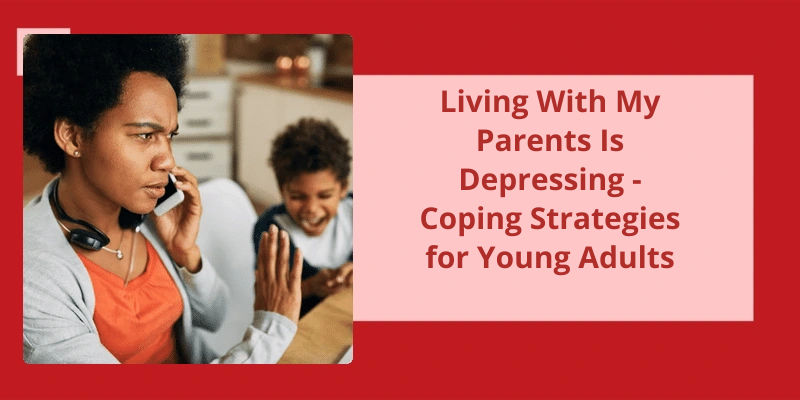Living with parents can be a challenging situation for many individuals, particularly if they experience feelings of depression or dissatisfaction with their current living arrangement. This may stem from a variety of factors, such as limited privacy, lack of independence, or strained relationships with family members. Coping with these difficulties can be overwhelming, but it’s essential to acknowledge these emotions and work towards finding a solution that prioritizes mental health and wellbeing. Whether it involves setting boundaries, seeking support from a therapist or friend, or preparing for a future transition, there are numerous strategies for navigating the complexities of living with parents and overcoming feelings of sadness or despondency.
Are Parents Happy When Their Kids Move Out?
The decision to have children is a significant one, and it undoubtedly changes many aspects of a persons life. One significant factor is the impact on their happiness levels. For decades, researchers have been studying whether parents are happier than people without children. The results were often inconclusive, with some studies suggesting parents were happier, while others found the opposite.
However, a recent study has shed some new light on this topic. The study suggests that while parents may not be happier than their childless peers initially, they may ultimately have the edge. The research found that parents happiness levels peaked when their children left home, and they began to enjoy a new sense of freedom and social connections.
There are many reasons why parents may experience a boost in happiness when their children move out of the home. For one, the financial strain associated with raising children typically decreases since they’re no longer providing for their offspring. Additionally, parents may have more time to engage in social activities or pursue their own interests and hobbies once their children are grown and have left the nest.
Moreover, once children are no longer living at home, parents may experience a renewed sense of purpose as they take on new roles and responsibilities in their lives. They may become more involved in their careers, take on volunteer roles, or have more time to focus on their relationships with their spouse or partner. All of these factors may contribute to an overall sense of happiness and fulfillment.
For some, it may be a difficult transition, particularly if they’re struggling with the emptiness or loneliness that can sometimes come with an empty nest. However, overall, this study provides hope that while parenting can be a challenging job, it may ultimately lead to a greater sense of happiness and satisfaction in later life.
Can Having Strong Relationships With Adult Children After They Move Out Positively Impact Parents’ Happiness?
Studies suggest that maintaining strong relationships with adult children after they move out can enhance parents’ happiness by providing them with emotional support and a sense of purpose.
Parents often experience mixed emotions when their children decide to move out of the family home. On one hand, they may feel sad and experience a sense of loss as they come to terms with their new identity as empty nesters. On the other hand, parents may also have conflicting feelings of resistance, especially if their child is leaving for reasons other than marriage or home ownership. This can lead to tension and conflict within the family as everyone adjusts to the new dynamic.
How Do Parents Feel When You Move Out?
Worried – parents may be worried about their childs safety and well-being when they move out. They may also worry about how they’ll cope financially and emotionally. This is especially true if their child is moving far away or to a different country.
Proud – while parents may experience sadness, resistance, and worry when their child moves out, they may also feel proud of them for taking this step towards independence. They may also be proud of themselves for raising a child who’s ready to spread their wings.
Lonely – parents may feel lonely when their child moves out, especially if they’ve been living together for many years. They may miss the everyday interactions and moments they used to share with their child.
Relieved – in some cases, parents may feel relieved when their child moves out. This may be due to tension or conflict in the family, or simply because they’re ready for a change in their lifestyle.
Excited – while it’s natural for parents to feel a range of emotions when their child moves out, they may also feel excited for what the future holds. They may look forward to new opportunities for personal growth, travel, and spending time with their spouse or other family members.
Ultimately, the way parents feel when their child moves out will vary depending on their individual circumstances and relationship with their child. It’s important to acknowledge these feelings and give yourself time and space to process them. At the same time, it’s also important to support your child in their journey towards independence and celebrate their achievements.
Source: When you told your parents you were moving out, how did …
However, while independence can certainly be liberating, it’s important to remember that it also comes with greater responsibilities and challenges. In this article, we’ll explore both the advantages and potential drawbacks of moving out of your parents’ house, and offer some tips for making a smooth and successful transition to independence.
Will Moving Out of My Parents House Make Me Happy?
This newfound freedom can be liberating and exciting, as you finally get the chance to take charge of your own life. You can make your own decisions, take risks, and experience new things without the constant supervision and input of your parents. This can be especially important if you’ve been feeling stifled or constrained by your familys expectations or habits.
However, it’s important to remember that with independence comes responsibility. You’ll need to learn how to manage your time, finances, and relationships in a way that reflects your values and goals. You’ll also need to navigate new social and cultural norms as you interact with people outside of your usual circle. This can be challenging, but the rewards are often worth it in terms of personal growth and fulfillment.
Another benefit of moving out is the opportunity to learn new skills and hobbies. Living on your own can be a great chance to explore your interests and try new things, whether thats cooking, gardening, painting, or anything else that strikes your fancy. You can also take advantage of community resources like classes or clubs to meet new people and learn from experienced teachers.
Overall, whether or not moving out of your parents house will make you happy depends on a range of factors, including your personal goals, values, and support system. It’s important to weigh the pros and cons carefully and make a decision that feels right for you. Remember that independence can be both empowering and challenging, and that the key to success is to stay open to new opportunities and to seek out help and guidance when you need it.
How to Prepare for the Responsibilities of Living on Your Own
Preparing for the responsibilities of living on your own requires developing good habits for budgeting, cleaning, cooking, and time management. You’ll also need to be prepared for unexpected challenges, such as repairs and emergencies. Learning these skills and being self-sufficient will help you successfully navigate the new responsibilities that come with living on your own.
Conclusion
Seeking out support and talking to a mental health professional can be helpful in navigating these feelings and finding ways to manage them effectively. Ultimately, the decision to continue living with parents or to pursue alternative living arrangements should be based on individual circumstances and needs.






